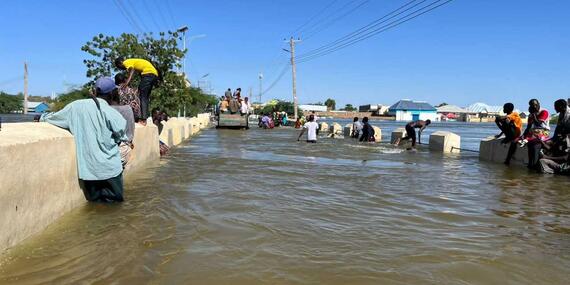Today's top news: Somalia, Myanmar, Sudan

Somalia
The UN and partners have stepped up assistance after massive flooding left a trail of destruction across the country.
The World Food Programme (WFP) is distributing 90 tons of high energy biscuits in isolated flood affected areas and cash assistance to more than 62,000 people in Belet Weyne, one of the most affected districts.
Partners are assessing needs and, at the same time, have started providing clean water to 60,000 for a month.
The water levels are still high, so it is difficult to reach all the affected people. WFP is planning to airdrop food to people who are still stranded in isolated villages.
We need to reach more people and we will need more funding and capacities in the coming days.
Myanmar
A massive clean-up effort is underway following the damage inflicted by Cyclone Mocha.
Millions of people were living in the cyclone’s path, mostly in flimsy shelters that were not built to withstand winds that reached more than 200 kilometers per hour when the cyclone hit.
Coastal areas of Rakhine State were hardest hit by the storm, but tens of thousands of people in northwest Myanmar and Kachin State were also affected.
In many parts of Rakhine State and the northwest, electricity and telecommunications services are still down.
Critical supplies – including fuel and clean water – are urgently needed.
Negotiations for humanitarian access are ongoing with all relevant stakeholders. Meanwhile, partners continue their field observations across Rakhine State and are ready to start coordinated field missions once approval is granted.
In parts of Rakhine State where there were pre-existing approvals and operations, humanitarian actors have provided some initial support to all affected communities, including both the Rakhine and Rohingya populations.
As of today, Sittwe Airport in Rakhine State has reopened to commercial flights.
Meanwhile, we urgently need additional funding to support relief efforts. Our Humanitarian Response Plan for 2023 – which was launched before the cyclone – is just 10 per cent funded.
Sudan
We continue to scale up deliveries of life-saving assistance to those in need.
WFP says it has now reached more than 300,000 people since restarting emergency distributions in Sudan two weeks ago.
The agency has provided more than 6,500 tons of food to people in several states, including Gedaref, Kassala, White Nile, North Darfur, East Darfur and Aj Jazirah. In North Darfur, more than 130,000 internally displaced people have received emergency food rations.
WFP says a vessel carrying more than 30,000 tons of food assistance docked in Port Sudan today.
So far, two cargo planes from the UN Humanitarian Air Service have arrived in Port Sudan, carrying critical supplies for UN agencies and other partners.
For its part, the UN Population Fund says reproductive health supplies will be distributed to hospitals and health facilities across Sudan, including in the capital, Khartoum and the states of Aj Jazirah, Red Sea, White Nile, South Darfur, West Darfur, Central Darfur and South Kordofan.
The supplies are sufficient to support more than 11,000 safe births, more than 2,000 caesarean sections and the treatment of more than 5,800 reproductive health emergencies, including the clinical management of rape and sexual transmitted infections.
